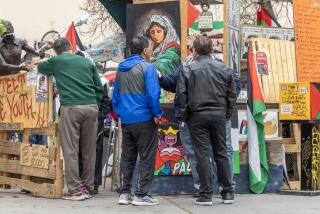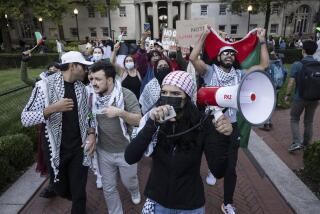Back to Basics of Caring: College Plans Course on Voluntarism for Academic Credit
- Share via
PHILADELPHIA — At most campuses, social activism is regarded as slightly more worthy than football or hockey but hardly a serious academic pursuit.
Temple University is one that thinks otherwise. Next spring, the school will offer an unusual course, for academic credit: “Voluntarism and Community Organization.”
The course, which will be open to 15 to 20 students, aims to teach them how to succeed as social and political activists, and will even require an internship with one of the 400 or so community-based volunteer organizations in the Philadelphia area.
The course will be taught by assistant sociology professor Ronnie Steinberg, a self-described “daughter of Republican parents” who discovered anti-war politics and feminism in the 1960s at Bennington College.
One guest lecturer is sure to be Bobby Seale, the fiery Black Panther Party leader and anti-war activist of the 1960s who is now a 50-year-old Temple graduate student in political science.
Combat Apathy
Temple thus joins a small but growing number of universities that regard voluntarism and philanthropy as legitimate subjects for academic study. And in Temple’s case, the decision also reflects the belief that universities must take greater responsibility for the current apathy among students.
Temple was one of 16 colleges and universities awarded grants of $15,000 each in the last two years by the Assn. of American Colleges to establish such courses. But Temple’s course stands out in combining academics with real-world experience.
Programs promoting student voluntarism and activism “tend to be downplayed at most schools. They are usually run by a non-academic unit, like the office of student affairs,” said Lois Cronholm, dean of Temple’s college of arts and sciences.
Seale as Speaker
One of the reasons Temple is taking student activism so seriously these days is the presence on campus since 1985 of Seale, still a committed and outspoken activist who serves as a liaison for the university to community groups in Philadelphia. He lectures at 25 to 30 campuses a year and plans to be a guest lecturer for the Temple course.
Seale helped organize conferences at Temple this fall exploring the current state of social activism. The first such gathering took place recently, and featured talks by education reformer Ernest L. Boyer, philanthropist George Pillsbury, actor Elliott Gould, defense attorney William Kunstler, and Rennie Davis and Tom Hayden, who were co-defendants with Seale in the Chicago 8 trial in 1969.
Seale said he finds most students know little about his past or about the Chicago 8 conspiracy trial in the aftermath of the bloody demonstrations at the 1968 Democratic convention. All eight co-defendants were acquitted, but not before the judge ordered Seale bound and gagged to stop his outbursts in court. He was later ordered jailed for contempt.
Seale smiles as he tells of an 18-year-old who asked, “Now, Mr. Seale, were you a basketball player or a jazz musician?”
Seale may have his work cut out in firing up Temple students for community activity.
‘Nobody Has Time’
“As they say, time is money, and nobody has time to be real active,” said Paul Kouroupas, a 21-year-old junior majoring in communications.
Even students who consider themselves politically active, like 19-year-old Chris Plant, take a dim view of the current climate. “I don’t think there’s a rallying point, like Vietnam. Now there’s abortion or (one-time U.S. Supreme Court nominee Robert) Bork, but nothing to organize students around.”
Wayne Meisel, who has visited some 200 campuses as executive director of the Washington-based Campus Outreach Opportunity League, which promotes student voluntarism, disputes the prevailing stereotype of students as self-centered and uncaring. “We are blaming the victims in some cases,” he said.
More to Read
Sign up for Essential California
The most important California stories and recommendations in your inbox every morning.
You may occasionally receive promotional content from the Los Angeles Times.










